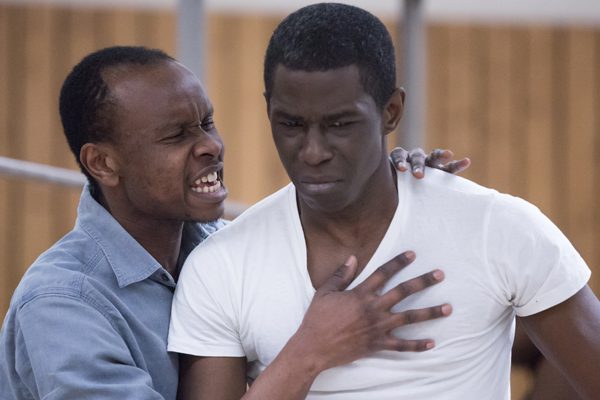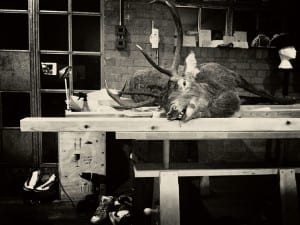Andrew Whaley’s play, The Rise and Shine of Comrade Fiasco at Gate Theatre transports the audience back to Zimbabwe in 1986. The piece focuses on Comrade Fiasco, a man who came out of a cave, seven years after independence claiming to be a freedom fighter. Fiasco finds himself in a cell with Chidhina, Febi and Jungle, who attempt to come to terms with Fiasco’s confused accounts of the war and their own personal feelings on what happened. We speak to writer Andrew Whaley about his initial idea for the play and the importance of considering independence now nearly 30 years later.
A: Your play, The Rise and Shine of Comrade Fiasco, is due to open at Gate Theatre. Where did the initial idea for the project come from?
AW: The Herald newspaper reported that a freedom fighter – with the nom de guerre, Comrade Disaster – had been found in a hillside cave on Zimbabwe’s Eastern border with Mozambique – more than six years after the war for Independence had ended. The news got tongues wagging. There was some speculation about Disaster’s credentials, as the story had emanated from the ruling party offices in a district of the country that had remained stubbornly, egregiously out of their political control. So, was it a PR stunt? Was Disaster genuine? Was he maverick, madman, dissident or Renamo rebel from Mozambique? Questions about his actual identity gave me a platform to delve deeper, through a bunch of characters, into who we were (or are) in post-independent Zimbabwe, and what had become of us and our freedom.
A: The piece revolves around three prisoners; do they represent three different responses to independence?
AW: Yes – who did what in the war was/ still is hotly contested. Finding real heroes was a lot more difficult, especially as post-independence euphoria waned and the political arena rapidly transformed into a VIP Exclusive Lounge. Looking back at the play now, I realise that it didn’t bother to address the political elite, which pleases me, because I do feel artistes spend too much time wrestling with the political gatekeepers and bouncers and not enough shaping our own imaginative autonomy. Actual power lies in our expression. The three in the cell are not criminals or political prisoners; they’re just ordinary people who drank too much on a weekend, got rowdy and have been detained overnight to cool off. When Fiasco is thrown inside for safekeeping, that’s the trigger for a sort of citizens’ enquiry into his claims to be a comrade. It starts another war with Chidhina, one of the guys in the cell who really did make sacrifices as a freedom fighter. And now Chidhina looks at his own life after independence and wants to know: For what?
A: Did you want these memories to mainly come from the dialogue or from the actors re-enacting what happened?
AW: The play was always going to elemental – four actors, four voices, a black surround, a silver bucket and a red blanket, transforming that space into many land-and-soundscapes. I am fascinated by the agility and power of riddles, metaphor and movement. It’s not possible (for me) to write something Zimbabwean that doesn’t have poetry, sensuality and a question. If metaphor and laughter connect us in conversation, then movement – often across time and space – incites other realities, some of them so close you are only conscious of them when they wake up and move – or perhaps realise too late once they’re gone, or have been removed. Western theatre seems to be happy to call it abstract or absurd theatre, as if there were a wall separating reality from imagination. But I think Zimbabweans move easily across these supposed divides, connecting tangibly by skirting and offering glimpses, teasing, suddenly ambushing; by making easy jumps through time and space. If the action of the play took place in a proper courtroom you’d expect a linear logic or narrative to become clear. But this happens in the chaotic, exhilarating aftermath of a civil war when everyone is living the promise of freedom. It’s fluid, playful and aggressive and relies on the theatrical art of impersonation. A lot of governments are in the business of making sure you either forget the past or at least remember the version they’re constructing for you. The past is another country, which they’ve improved on. But each character in the play has a singular, non-prescriptive way of bringing the phenomenon of nationhood to life. When a mysterious comrade is dropped into the mix, a well-meaning welcome quickly becomes explosive. The actors role-play, shift shape, stumble over sentiment and bias and relive moments of individual and collective memory. The more they search, the more suspicious they become. They question themselves and Zimbabwean society… because you can’t question others without questioning yourself.
A: The play is set in 1986, nearly 30 years ago. Why do you think it is important to reconsider these events now?
AW: Historical accuracy is relatively unimportant, or at least can be debated and contested. But memory… memory can be hot enough to fry an egg. What’s concerning to me is the existential examination of our country, our home, Zimbabwe. Our freedom promised so much. What have we got? There’s no single answer to that question, but for artists at least there’s plenty to get on with in our search for meaning and delight. The past isn’t another country. It’s everywhere in the one you’re living in.
A: What would you like audiences to take from the play?
AW: I would like them to remember, de-clutter and rediscover pieces of our common humanity and pride. While The Rise and Shine of Comrade Fiasco is a Zimbabwean play, it is also an overthrow of stuff that reduces, limits or oppresses our experience. I’d like audiences to feel it, laugh, reconnect.
The Rise and Shine of Comrade Fiasco, 26 February – 21 March, Gate Theatre, 11 Pembridge Road, Notting Hill Gate, London W11 3HQ.
Credits
1. Image courtesy of Michael Shelford.





